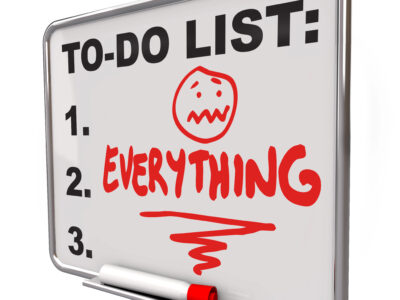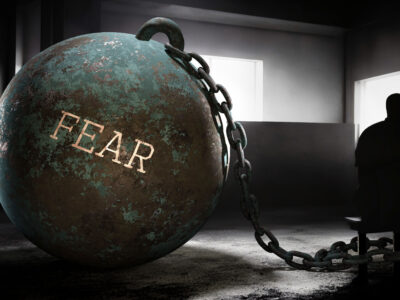It’s Blocktober!
A few years ago, the writer Mason Currey decided he’d give this month a theme. He called it Blocktober, and posted about the obstacles we put in the way of creative work – and how to solve them.
It’s an idea I’ve run with ever since. Although this year, I over-complicated it to such a degree that I’ve barely posted anything yet.
(Note to self: perhaps 31 social media posts, five new blogs posts and a little book were too ambitious for a month when my calendar was already quite full?)
So today I thought I’d talk a lot about a block that’s come up a lot in recent coaching sessions, as well as in my own life. Overwhelm.
Most of us feel a little overwhelmed right now.
Even putting aside the awful world news, technology is advancing at an ever-increasing speed.
We are flooded with information 24/7: more words, images, posts, memes, video clips than anyone could possibly consume.
There seem to be very few checks and balances, no pauses while we consider if the latest innovation is a good thing. And in the creative industries, the disruption is dizzying.
The gatekeepers have lost their power.
Many of the old ways of earning a living from creative work are disappearing. Instead, there are exciting new opportunities. New ways of sharing our work, building an audience, reaching new clients, creating new income streams.
But there are also no clear roadmaps, no guarantees that any of this will work for us. And no time to get a grip on any of it, because there seem to be new channels and apps launching almost daily.
Do you launch a podcast, a YouTube channel, a SubStack? Do you focus on your website, sell on TikTok, network on LinkedIn?
The choice can be paralysing. So many options. Endless new skills to learn. Hordes of ‘experts’ shouting at us online. And so many things we feel we have to do.
It’s little wonder that we all have times when we try to do so much that we end up doing very little at all.
You can’t do everything.
One of my clients – a best-selling author – told me that all he ever wanted was to research ideas, and write about them in his books. But to do that at the high level he does, he’s also become the unwilling head of a media empire.
He had a popular YouTube channel. A podcast of his own, plus endless guest spots on other big podcasts. He produced a weekly newsletter, wrote profile-boosting think pieces for newspapers and magazines, created courses and masterclasses, and frequently appeared on TV panel shows.
And he was exhausted.
When we started working together, he was burned out, grumpy, and struggling to find time to write his books. He was even questioning whether he should still write, or whether he should focus on growing his YouTube channel, which was starting to bring in a healthy income.
Over the past two years, he’s reconnected with his values, and with what makes him happy and fulfilled. Which is writing.
He’s run experiments to see what’s most effective, to help him reach new readers. Gradually, he’s recruited freelancers to help with his video and audio output, automated and outsourced regular tasks, and cut out almost everything that involves travel or stress – including the TV shows.
He’s much happier, and he’s making calm, daily time for the writing and research he loves. But it took time, patience, and some painful choices along the way.
Focus on what’s important to you.
It’s easy to get addicted to the buzz of ticking off meaningless tasks, while neglecting the (often more challenging) things that are really meaningful to us.
We keep telling ourselves that once we’ve cleared the decks, got rid of all these minor irritants, then we’ll finally have more time for the people or activities we love, and the headspace for the work we really want to do.
Except it doesn’t work that way.
In the era of the endless scroll, new content is uploaded in breath-taking amounts every second. An hour after you attain that much vaunted in-box zero, new email will be filling it. You deal with all the outstanding issues raised on Slack or Teams, and soon after there will be replies to your replies, new issues, more to process.
In his book Meditations For Mortals, Oliver Burkeman suggests that we no longer see the torrent of information pouring into our lives as something we need to manage, consume and keep on top of. That simply isn’t possible.
Rivers, buckets – and choices.
Instead, he suggests we view it as a river, flowing calmly past us. You can dip a bucket in whenever you like and take what you want or need. But you certainly can’t empty it.
He also suggests that we stop seeing our to-do list as something we need to clear before we can rest or relax. Instead, we might view it as a menu, a set of choices for that day.
There will always be new tasks added to the list, new problems to solve, more we could do. But we don’t have to do it all, right now.
We don’t have to earn or deserve a rest, or time to do things we enjoy. We just need to take it.
You have to decide what is enough, for you.
Enough work for the day, enough scrolling, enough information, enough new stuff. Set limits. Introduce constraints. Allow the working day to end.
Trust yourself. Experiment.
Get curious about what works for you.
See what happens if you don’t try and do it all.
And remember that no is always an option.
Focus on just one thing at a time.
Do it as well as it needs to be done. Sometimes that will be to a high standard. But sometimes, it doesn’t need your best game.
You’re writing a quick email, not War And Peace. You’re feeding your family, not auditioning for Masterchef. Recognise when you need your best game, and when you’re just doing a rough draft, a quick edit, a preliminary meeting.
It’s liberating to consider that sometimes, it’s enough to half-ass it. That imperfect is fine. And frees you to move onto the next thing.
Notice your shoulds, musts, oughts.
Just because you can do something, that doesn’t mean you have to. Even if you do it exceptionally well. Check in with yourself.
- Who says you have to do this?
- Are these really your projects and priorities, or are you trying to live up to the expectations of others?
- If you didn’t feel you were letting anyone down, would you finish this task or project?
- If it doesn’t excite you, fit in with your values, pay decent money or enlarge you in other ways – what would the consequence be if you dropped it altogether?
Batch smaller tasks.
Instead of replying to messages and email all day, do it 2-3 times a day. I like to put a timer on for 15-20 minutes, and work down my in-boxes as quickly as I can, deleting, giving quick replies, putting events in my calendar, or moving more complex issues to another folder that I return to regularly, when I have more time to focus.
People will soon learn that you don’t reply instantly – but you do reply within a day or so.
Admin, phone calls, social media – it’s all easier if you do it in blocks, rather than dipping in and out all day and letting it distract you from deeper creative work.
Pay yourself first.
Create regular focussed time without noise and distractions for the projects you really want to work on. If you already have a full-time job, perhaps it’s only a couple of hours on a Saturday morning. If you have more control over your time, perhaps it’s an hour or two most days.
Don’t try and clear the decks first, or wait for time to magically open up. Block out time on your calendar to do deep work, and treat it as you would any other important appointment.
Think long-term.
At the end of your life, no one will care how many emails you answered – least of all you.
But you will care about the books you wrote, the songs you recorded, the art you made, the people you loved, the experiences you had. So focus on that. Now.






What do you think?